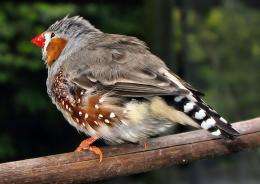August 7, 2012 report
Researchers eliminate aggression in birds by inhibiting specific hormone

(Phys.org) -- James Goodson and colleagues at Indiana University have found that by altering the secretion of the hormone VIP in certain parts of the brain, treated birds lose their aggressive tendencies. As they write in their paper published in the Proceedings of the National Academy of Sciences, by altering the DNA of brain cells in the hypothalamus, the team was able to effectively reduce aggressive behavior in the birds with no other apparent side effects.
Vasoactive intestinal polypeptide (VIP) is a hormone that is produced by many different cells throughout the body in mammals, from the gut to the brain. In this new research by Goodson, et al, the focus was on the impact of the hormone when it is secreted by nerve cells in the hypothalamus, a part of the brain that controls among other things, aggressive tendencies.
Building on earlier work that found that sending an electrical charge to the hypothalamus of test mice produced more aggressive mice, the team focused on the anterior hypothalamus (AH), which is the part of the hypothalamus believed to be most responsible for aggression. In an earlier experiment, Goodson and his team found that they could predict how aggressive a species would be based on the amount of VIP in the AH. Moving a step forward, the team this time altered the amount of VIP produced by the neurons of violet-eared waxbills, a notoriously aggressive bird, in the AH by altering their DNA. In so doing, they found that they could control the amount of aggressiveness in the birds by tweaking VIP production up or down.
In studying birds that had had their VIP production levels reduced, the team found that rather than physically fighting with other birds, the treated birds instead resorted to arguing, a sign that the part of their brain that didn’t care for anyone other than its mate was still intact. Refraining from physical confrontations on the other hand showed that reducing the level of VIP production clearly reduced aggressive tendencies.
Then, to see if their results would hold, the team repeated the experiment with a different species, the zebra finch, which isn’t nearly as aggressive to start with. There they found the birds even more peaceful than they normally are. What’s more, the team couldn’t find any other changes in the birds of either species. They both behaved exactly as they had before, except they were less aggressive, a finding that stirs all manner of thoughts when considering the possible ramifications of altering hormone production in the brains of people.
More information: sites.bio.indiana.edu/~goodson … b/photogallery2.html
Paper: Goodson, J. L., Kelly, A. M., Kingsbury, M. A., Thompson, R. R. (2012) An aggression-specific cell type in the anterior hypothalamus of finches. Proceedings of the National Academy of Sciences, in press. DOI:10.1073/pnas.1207995109
Journal information: Proceedings of the National Academy of Sciences
© 2012 Phys.org



















